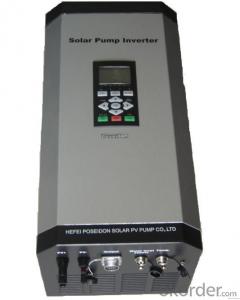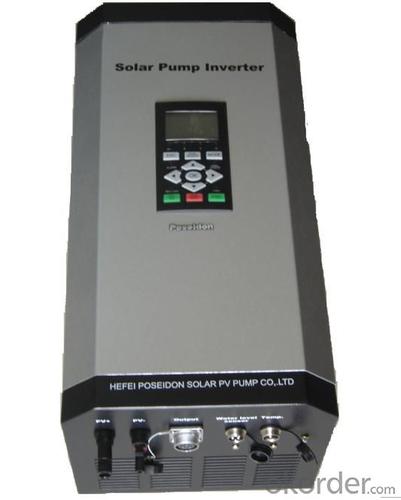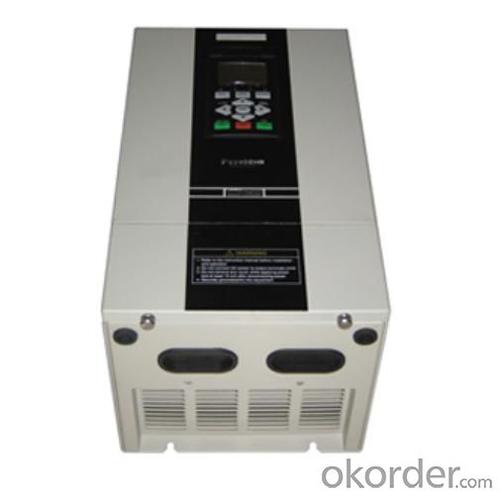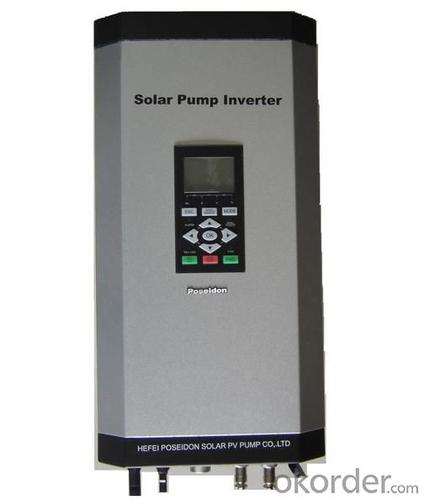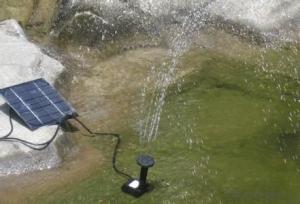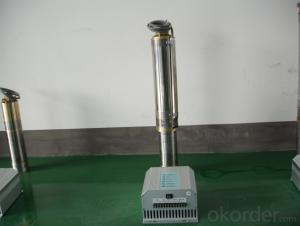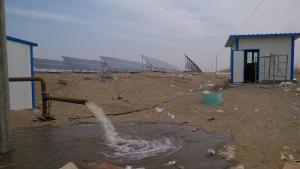Large Pond Solar Pump FCPM1100L Inverter
- Loading Port:
- China Main Port
- Payment Terms:
- TT OR LC
- Min Order Qty:
- -
- Supply Capability:
- -
OKorder Service Pledge
Quality Product, Order Online Tracking, Timely Delivery
OKorder Financial Service
Credit Rating, Credit Services, Credit Purchasing
You Might Also Like
Solar pump inverter FCPM1100L Product Description:
Solar water pumping system is constructed with solar panel array,solar pump inverter and AC water pump, DC current produced from solar panel will be delivered to solar pump inverter,and it will convert it into AC current to drive water pump,and will automatically regulate output frequency according to sun radiance intensity,maximally realize MPPT tracking function.
Features
Adopting the proposed dynamic VI maximum power point tracking (MPPT) control method, with fast response, and reliable operation, achieves efficiency of 99%.
Designed with variable frequency driver, greatly improves efficiency
Extremely high efficiency
Digital mode control, with automatic operation and manual operation mode options
Complete protection functions
Adopts intelligent IPM module, with high reliability
LCD display and operation panel, in real time presents operating data
Optional for water level measurement and control circuit
Applicable for general ACC pumps, like centrifugal pump, piston pump etc.
Independent intellectual property; Highly effective, the redundant reliability, exempts the maintenance and the long life.
The pumps are soft started, fully protected.
No batteries are used. So better Sunlight, more water.
Datasheet.
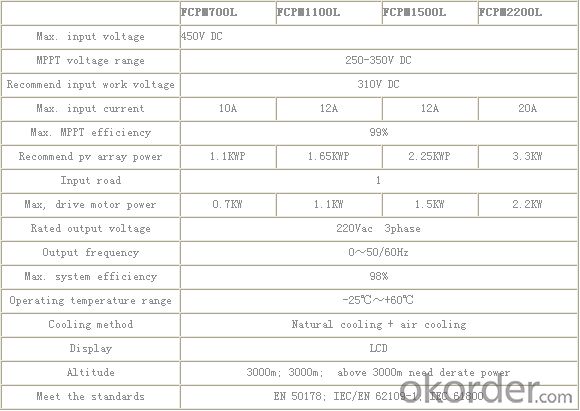
- Q: How does the quality of solar panels affect the performance of a solar pump system?
- The performance of a solar pump system is significantly influenced by the quality of its solar panels. Solar panels of superior quality are designed to efficiently convert sunlight into electricity, thereby ensuring a steady and dependable power supply for the pump system. Conversely, solar panels of inferior or substandard quality may exhibit lower efficiency and fail to generate adequate electricity to power the pump system effectively. The efficiency with which solar panels convert sunlight into electricity is a crucial factor affecting their performance. High-quality solar panels typically possess a higher efficiency rating, enabling them to generate more electricity from the same amount of sunlight in comparison to lower-quality panels. This heightened efficiency translates to a greater amount of power being available for the operation of the solar pump system, enabling it to pump water at a faster rate or function consistently during periods of low solar irradiation. Furthermore, the durability and reliability of solar panels also play pivotal roles in their performance. High-quality panels are engineered to withstand diverse weather conditions and possess a longer lifespan, thereby ensuring consistent performance over time. Conversely, low-quality panels may deteriorate rapidly, experience efficiency loss, or even fail prematurely, resulting in diminished performance or complete system failure. It is also important to consider the quality of materials utilized in the construction of solar panels. High-quality panels are manufactured using premium materials and advanced processes, ensuring superior resistance to environmental factors such as UV radiation, extreme temperatures, and humidity. This ultimately leads to enhanced longevity and performance of the solar panels, which in turn benefits the overall performance of the solar pump system. In conclusion, investing in high-quality solar panels for a solar pump system is vital in order to maximize its performance and efficiency. These panels offer higher conversion efficiency, improved durability, and a longer lifespan when compared to lower-quality alternatives. By opting for high-quality solar panels, the system can operate reliably and consistently, providing sufficient power to meet water pumping requirements even in challenging conditions.
- Q: Can a solar pump be used for water supply in poultry farms?
- Yes, a solar pump can be used for water supply in poultry farms. Solar pumps are a viable and sustainable option for providing water to poultry farms as they utilize solar energy to operate, eliminating the need for electricity or fuel. They are cost-effective, efficient, and environmentally friendly, making them an ideal choice for water supply in poultry farms.
- Q: How does a solar pump handle water with high levels of dissolved solids?
- A solar pump can handle water with high levels of dissolved solids by utilizing a filtration system. This system helps remove the solids from the water before it reaches the pump, preventing any potential clogging or damage.
- Q: Are solar pumps weatherproof?
- Yes, solar pumps are typically designed to be weatherproof. They are built to withstand various weather conditions such as rain, snow, and extreme temperatures. However, it is always recommended to check the specifications and manufacturer guidelines for specific models to ensure their weatherproof capabilities.
- Q: Can a solar pump be used for cooling systems in data centers?
- Yes, a solar pump can be used for cooling systems in data centers. Solar pumps are commonly used in various applications, including heating and cooling systems. In the case of data centers, where cooling is of utmost importance to maintain optimal operating conditions, a solar pump can effectively circulate cool water or coolant to cool down the servers and equipment. Solar pumps work by using solar energy to power the pump, eliminating the need for electricity from the grid. They are typically connected to a solar panel or array, which converts sunlight into electricity. This electricity powers the pump, allowing it to circulate the cooling medium in the data center's cooling system. Using a solar pump for cooling systems in data centers has several benefits. Firstly, it reduces the reliance on traditional electricity sources, leading to cost savings and a more sustainable operation. Solar energy is renewable and abundant, making it an environmentally friendly choice for powering data center cooling systems. Additionally, solar pumps are often designed to be highly efficient, ensuring the maximum utilization of solar energy. This efficiency translates into better performance and reduced energy consumption, which is crucial for data centers aiming to optimize their energy usage and reduce carbon footprint. However, it is important to note that the use of solar pumps for cooling systems in data centers may not be suitable in all situations. The effectiveness of solar-powered cooling depends on factors such as the availability of sunlight, the size of the data center, and the cooling requirements. In some cases, a combination of solar and traditional electricity sources might be necessary to meet the cooling demands of a data center. Overall, a solar pump can certainly be used for cooling systems in data centers, providing a sustainable and energy-efficient solution to meet the cooling needs of these critical facilities.
- Q: Can a solar pump be used for water supply in hotels or resorts?
- Yes, a solar pump can be used for water supply in hotels or resorts. Solar pumps are efficient and environmentally friendly options to provide water supply in remote locations. They can effectively pump and distribute water for various purposes such as irrigation systems, swimming pools, and general water supply needs, making them suitable for use in hotels and resorts. Additionally, solar pumps can operate independently from the grid, reducing energy costs and dependence on conventional power sources.
- Q: What is the payback period for a solar pump installation?
- The payback period for a solar pump installation depends on various factors such as the initial cost of installation, the amount of energy saved, and any applicable incentives or subsidies. On average, the payback period for a solar pump installation ranges from 3 to 7 years. However, it is important to conduct a detailed analysis considering the specific circumstances and costs involved to accurately determine the payback period.
- Q: Can a solar pump be used for water supply in off-grid botanical gardens?
- Water supply in off-grid botanical gardens can be facilitated by the use of solar pumps. These pumps are an environmentally friendly and sustainable option for remote areas lacking traditional electricity. They function by converting sunlight into electricity through solar panels, which in turn powers the pump to draw water from sources like wells or ponds. Consistent and reliable water supply is crucial for the well-being and growth of plants in botanical gardens. Solar pumps offer an ideal solution for such locations, as they eliminate the need for grid electricity or fuel. Furthermore, they are available in various sizes and capacities to meet the specific requirements of each botanical garden. These pumps can be utilized for irrigation systems, water features, and even to provide drinking water for visitors and animals within the garden. Additionally, solar pumps can be integrated with water storage systems, such as tanks or cisterns, to store water during periods of limited sunlight or high demand. By implementing solar pumps, off-grid botanical gardens can reduce their reliance on fossil fuels and minimize their carbon footprint. Furthermore, they can enjoy the financial benefits of not having to purchase electricity or fuel for traditional pumps. In conclusion, solar pumps offer an efficient and sustainable solution for water supply in off-grid botanical gardens.
- Q: How does a solar pump handle water source contamination from nuclear power plants?
- A solar pump does not directly handle water source contamination from nuclear power plants. Its primary function is to harness solar energy to pump water from a source, such as a well or river, and does not have the ability to address or mitigate contamination caused by nuclear power plants. Handling water source contamination from nuclear power plants requires specialized systems and processes designed to treat and purify the water to remove any radioactive substances or pollutants.
- Q: Can a solar pump be used for artificial waterfalls?
- Yes, a solar pump can be used for artificial waterfalls. Solar pumps are a sustainable and eco-friendly option for powering water features, including artificial waterfalls. They use solar energy to generate power, eliminating the need for electricity or batteries. Solar pumps are efficient and can provide sufficient water flow and pressure to create a beautiful and captivating waterfall effect.
Send your message to us
Large Pond Solar Pump FCPM1100L Inverter
- Loading Port:
- China Main Port
- Payment Terms:
- TT OR LC
- Min Order Qty:
- -
- Supply Capability:
- -
OKorder Service Pledge
Quality Product, Order Online Tracking, Timely Delivery
OKorder Financial Service
Credit Rating, Credit Services, Credit Purchasing
Similar products
Hot products
Hot Searches
Related keywords
